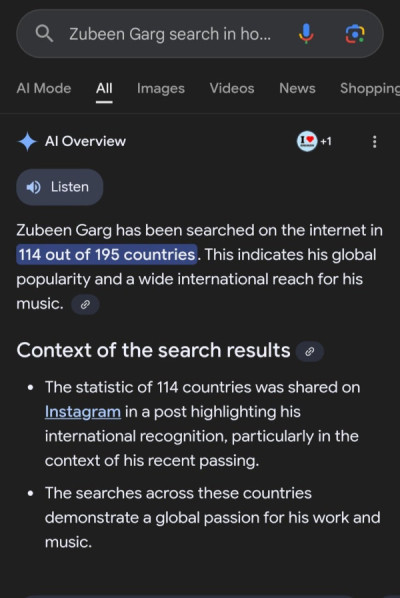Detailed Notes
According to digital analytics reports and social media trends, Zubeen Garg was searched in 114 countries out of 195 worldwide, a stunning testament to his global influence and fanbase.
The Internet Reacts: Shock, Tribute, and Digital Uprising
The news of Zubeen Garg’s death spread faster than ever before in Assam’s history of internet activity. His fans — often referred to as the Zubeenians — flooded the web with messages of love, anger, and disbelief.
How Many Countries Searched for Zubeen Garg?
-
His name was searched in 114 countries out of 195 worldwide.
-
The highest search activity was recorded in India, Singapore, Bangladesh, Nepal, Bhutan, the UK, the USA, Canada, and the Middle East.
-
Countries as far as Brazil, Germany, France, and South Africa also recorded spikes in search queries related to his death.
This massive online attention shows how Zubeen Garg’s music transcended geography and language, uniting listeners from diverse cultures under a shared sense of loss.
The Internet Explosion: Data and Digital Reactions
-
“Mayabini ratir bukut” — one of Zubeen’s most emotional songs — was replayed millions of times.
-
His funeral videos were streamed by thousands in real-time, with people watching from over 60 countries.
-
Celebrities and politicians, including musicians from Bollywood, posted heartfelt messages, praising his contribution to Indian music.
From Mourning to Movement: Internet as a Platform for Justice
The campaign’s goals were clear:
-
Demand a fair and transparent investigation into Zubeen Garg’s death.
-
Keep his musical and social legacy alive online.
-
Unite Assamese communities across the globe under one digital banner.
The campaign reached millions within days, showcasing the power of collective online activism in modern Assam.
The Role of Global Media and Internet Trends
Major international media outlets such as BBC Asia, Reuters, and Channel NewsAsia reported on the case, citing the public unrest and the global digital reaction.
Information vs. Misinformation: Lessons from the Internet Reaction
Both the Singapore Police Force (SPF) and the Assam CID have urged people to rely on official updates, reminding that digital responsibility is key in emotionally charged cases.
Conclusion: Zubeen Garg’s Legacy Lives Online
Zubeen Garg’s passing was not the end of his journey — it became the beginning of a digital legacy. His music, ideals, and words continue to echo across continents.
From Guwahati to London, from Singapore to New York, his songs still play, his fans still post, and his voice continues to connect people through screens and speakers.
In death, he gave the world a reason to listen.
